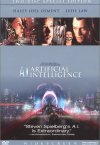BUY THE DVD:
|


|
|
|
SYNOPSIS:
| |
a highly advanced robotic boy longs to become "real" so that he can regain the love of his human mother.
|
|
|
MOVIE FACT:
| |
when this film was in production, counting down had a link to a web-cam of the craft services area for the crew of a.i..
|
|
|
RATING:
|

three out of four possible stars
|
|
|
|
What Steven spielberg has created with A.I., is a behemoth of a film that roars forth a sermon worthy of Martin Luther. The bottom line is, this film preaches too much. And why make a two an a half hour movie stressing something that should be common sense? For all its emotion and sappy sentiment, this film does not succeed in making me "think" about my actions. It tries to teach me something that I already know and doesn't try to make its lesson a variation on what's already known. It is pure lecture all the way through. Instead of finding some interesting way to mask the lesson learned, it throws it like a baseball right into the audience's face.
With Artificial Intelligence, Spielberg has tried to emulate, replicate, and duplicate Stanley Kubrick's style of filmmaking. But what he has succeeded in accomplishing is taking a style that is quintessentially Kubrick and sprinkling and littering it with Speilbergisms. Now, this author will argue to the death against the praise given to Kubrick's films, but even non-fans have to give the man kudos for never backing down on his standards of filmmaking to create a genre essentially all his own. But after Spielberg took hold of this film, he strangled all that was Kubrick out of it and created something pseudo-Spielberg that doesn't really work.
And that's a shame, because the performances in the film ain't half bad. It's hard to find fault with Haley Joel Osment's acting. He gives a very strong and emotional performance as "David Swinton" and it's easy to see why the little chap is compared to actors three and four times his age. His acting is just downright heart-rending, but when the movie is over and the popcorn buckets have been thrown away, it isn't easy to become emotionally attached to this character. But phenomenal special effects and good performances aside, this story has already been presented on screen -- more than once -- and the ending isn't hard to ascertain. The message of "don't go messing with forces you can't control," is swept under the carpet of preditability, which is a rare feat, coming from box-office guru, Spielberg. Whatever the message, it's projected so loud and clear that its hard to just enjoy the movie for what it is: a science fiction flick.
Jude Law also turns in a fine performance as "Gigolo Joe," the lover robot who can, with a twist of his neck, jumpstart a soundtrack that plays jazzy love songs from somewhere on his body. Joe meets up with David after becoming a fugitive from justice and the two begin a quest to find the mystical "Blue Fairy." Yes, the same one from the Pinocchio. The theme of the "little wooden boy who wants to become real" is alluded to throughout this film.
This film also felt strangely sterile. Now perhaps that was what the filmmakers were aiming for in the look and feel for this film, but this barren landscape was not populated by interesting and intense characters (like say in 2001). So you have a lifeless film filled with people who can't make up for that void. Two good performances (from Osment and Law) cannot fill up a film this large in scope and this long.
And that brings us to my largest complaint on the film: the length. And this complaint is two-fold. First of all, the film moves much too slowly. Its tempo is lethargic and entirely too spaced out. The events propelling the plot forward happen only after each scene has dragged on for minutes and minutes and minutes. I remember sitting in the theater and looking down at my watch and realizing that only one hour had passed since the start of the movie and that I had a whole hour and 24 minutes ahead of me for my viewing pleasure. And then I looked again at my watch at the two hour mark and thought, hmm, I know there's over twenty minutes left, but the movie's over. What else could happen? And that's when the Spielbergisms really kicked in.
I think that I would have a much more positive attitude toward this film if only they had stopped the camera at the two hour mark. But spielberg decided to tack on the weird surrealistic ending that I don't believe would ever have been filmed in a stanley kubrick movie. The movie ends with an almost peachy satisfied ending that made me realize: I am watching a Steven Spielberg film. If kubrick were in charge, I bet he would have let the movie end at two hours. But no, spielberg has to add a "happy" ending to a lethargic film. It's as if he's denying the whole point of the film with this ending. He went out to make a movie about the dangers of playing with fire and at the end, he douses it and puts the entire flame out, instead of just controlling the blaze. And if you see this film, you'll know what i'm talking about. It's just another one of those hollywood endings.
This film is at best a marginal representation of what Spielberg and Kubrick usually present in their films. The movie lacks the tremendous energy always present in spielberg's films and it doesn't even begin to touch that unfriendly feeling so many of kubrick's films radiate. It just huddles somewhere in the middle, never becoming something unique and interesting.
Review by Kelsey Wyatt.
| |
|